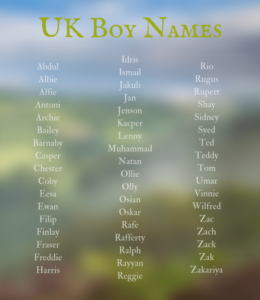When we talk about British culture, the first thing that comes to our mind is the dramatized idea of royal families, knights, and tall stone castles. Many movies and book novels portrayed medieval England which gave us a clear picture of how Great Britain looked before.
Traditional British names follow the old naming conventions rooted back in old Britain. Unlike other civilizations, Great Britain is a result of unifying multiple kingdoms under one common ruler, thus the name The United Kingdom is derived. This means that multiple cultural influences dictate the traditional British naming convention that we now know very well today. It may include names with influences from Germanic, Scandinavian, Latin, Hebrew, and Anglo-Saxon.

Naming conventions are heavily influenced by the history of a culture or country. Mainland Britain was first occupied by Celtic ethnic groups scattered in its regions. In 43 AD, the Roman army reached the British shores but was heavily opposed by the native Celtic occupants of the area. The Romans named the surrounding lands Albion, or White Land, and was eventually renamed Britannia when they successfully invaded and incorporated much of the lands as a new Roman province. The Romans governed Britannia for almost 400 years, making Latin a common name in most parts of the land. Although the old Celtic and other tribe naming conventions co-existed with the Roman names.
Roman rule started to decline in the late 6th century. New independent tribes expanding their territories started to raid the borders of the once Roman-occupied Britain cities. Germanic groups such as the Angles, Jutes, and Saxons, sailing from the North Sea started to raid British villages. Irish raiders from the northern mountains are also a huge threat to the peace of the British cities. By around 650AD, most of the independent British lands were conquered by the Angles and Saxons, which later on became known as the English people or Anglo-Saxons, thus starting the rule of the English people in Britain. With this change of rule, Germanic and Anglo-Saxon languages, as well as their naming conventions, were all incorporated into Britain.

By end of 6th century, sea-raiding people known as Norsemen or Vikings started raiding fishing villages in the northern British Isles. These Norse raiders were often referred to as Viking raiders. In the early 9th century, the British were able to defeat a Viking army and baptized their leader into Christianity. This started the formal occupation of some Norsemen into British lands, thus incorporating Scandinavian influences into British names. Christianity flourished at the beginning of the 7th century when missionaries from Rome started reaching the British isles. Most of the English rulers during this time quickly converted to Christianity, thus adding the influence of Latin and Hebrew into British names.
British names follow the naming rules conveyed by the Romans. A person’s name is written starting with their first name followed by their middle name and family name. This traditional British naming is followed in most countries around the world today.
Below are some examples of traditional British names with their corresponding influential grassroots.

Since Britain is a mix of different cultures, surnames might have different forms depending on their source of influence. For example, British families with Norman blood have Norman-like surnames such as Mortimer, Baskerville, and Hudson. People with influences in Latin and French will have surnames like Lawrence and Cooke. There are also modernized surnames wherein the surname of the mother and father are combined, separated with a dash. Examples are Jason-Crow and Adams-Grey.

British names can be easily identified due to their popularity and influence around the world. Despite this, there are old British last names that still exist among few families. These last names have a direct origin in the Old English language, making them rarely used today. Below are some examples.